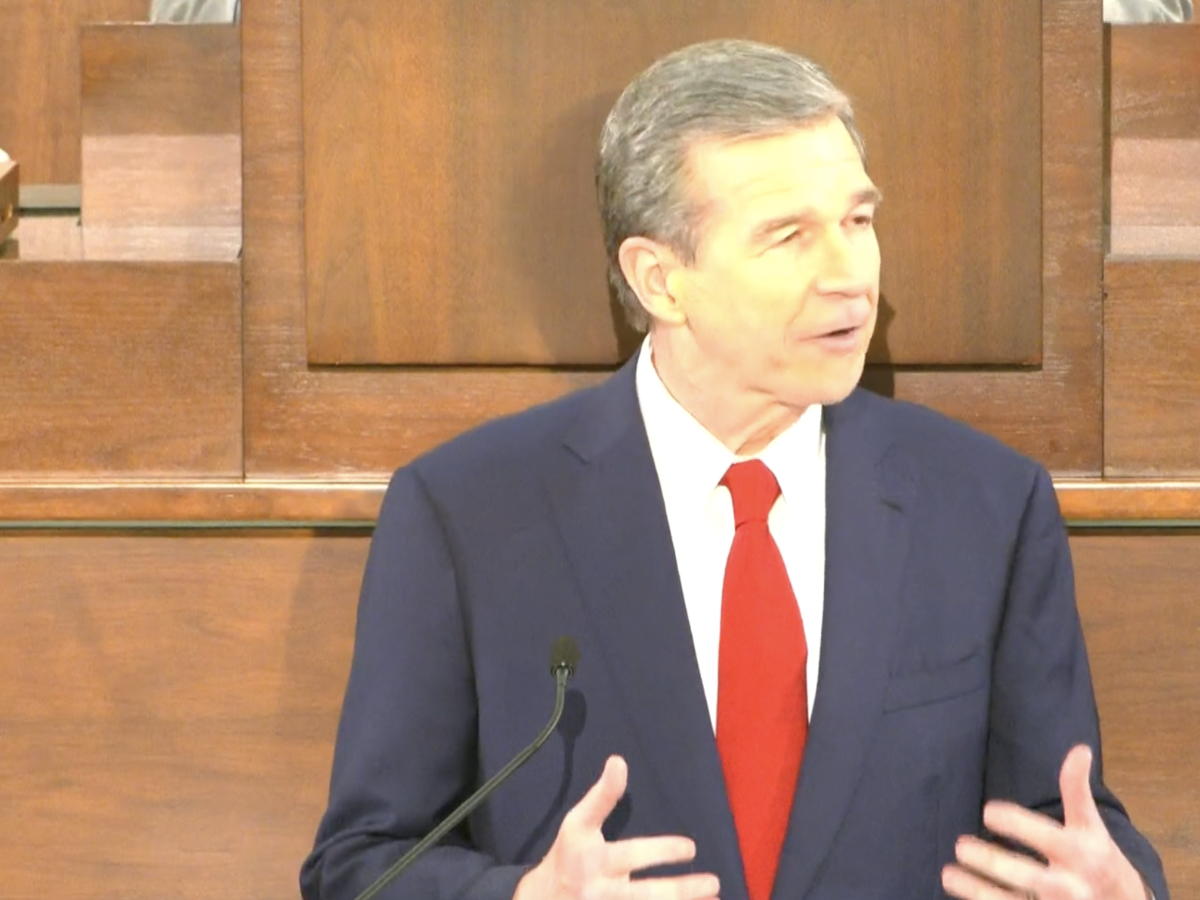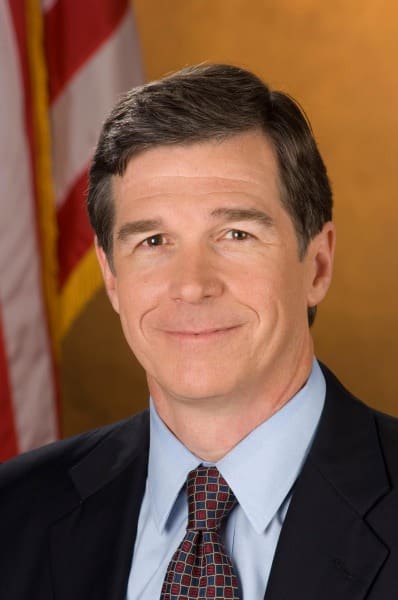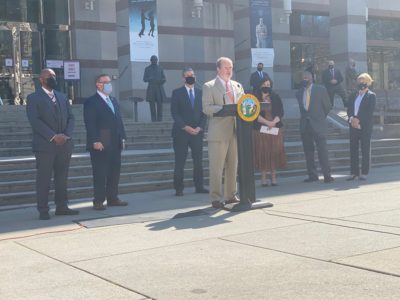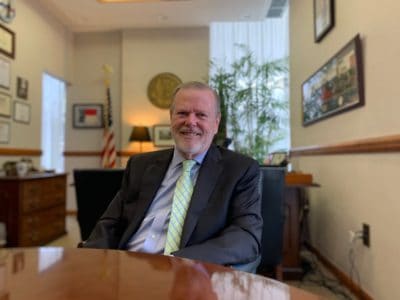

|
|
Democratic Gov. Roy Cooper gave his State of the State address to the Republican-led General Assembly Monday evening and education featured prominently in his remarks, including when it comes to his vision for state spending.
“I don’t want to have to veto the budget, and I will do my part to see that we have a budget and I expect you to do yours,” he told lawmakers in his remarks. “And I want to see a budget that has three signatures: Speaker Moore’s, Senator Berger’s, and mine. Our people deserve it.”
Cooper said that towards the end of his address, after touting his proposed budget’s ability to meet the challenges facing North Carolinians. His two-year spending plan includes bonuses and salary increases for teachers and other education staff.
During his speech, Cooper said that better teacher pay, among other things, is important in making sure the state meets its goal of getting 2 million North Carolinians a high-quality credential or postsecondary degree by 2030.
“Our pledge … must begin with more children getting high quality pre-K and a healthy start at birth,” Cooper said. “More children who learn to read in elementary school. More children inspired to learn trades in middle school. And more well-paid educators who can guide children as well as adults getting trained for a second career.”
He said teacher raises are even more important now since teachers did not get one during the last biennium budget cycle thanks to the failure of Cooper and Republican lawmakers to come to an agreement. That ended with Cooper vetoing the legislature’s two-year budget plan and legislative Republicans failing to override the veto.
Cooper’s remarks come on the same day that the National Education Association released its annual national teacher pay rankings, showing North Carolina down two spots from 31 to 33 between 2018-19 and 2019-20.
In his speech, Cooper also highlighted other education items that are featured in his budget or may be featured in his upcoming plans for how to spend the latest round of federal COVID-19 aid.
“Education and health care will get us well on our way. But to cement North Carolina’s spot as best in the nation for business and industry, we have to solidify the state’s backbone,” he said. “Its infrastructure — schools, water and sewer, roads, bridges, transit — and also its pathways for information. High speed internet is vital for education and telemedicine but also for every person, from small business owner and farmer to big corporation and hospital,” he said.
During his press conference on his budget plans, Cooper had signified that the absence of money for things like broadband expansion in his plan was due to the fact that he would eventually propose using federal COVID-19 relief funds to address the issue.
Cooper’s proposed budget also included a bond to address infrastructure needs in the public education arena.
“We’re seeing the lowest interest rates. We can afford it, it will create jobs, and we’re never going to get a better deal. So let’s come together and pass a strong bond referendum so we can get this done,” he said.
Cooper also highlighted a number of education-related North Carolinians as examples of the state’s resilience during the COVID-19 pandemic, including Felecia Young, a math teacher at Knox Middle School in Salisbury. He said she “went the extra mile” to make remote learning engaging.
“She produced videos with music, dance, and song that helped you with math even though you didn’t want them to. She kept in such close contact with her students and their families, she earned the nickname ‘Mama Young,'” he said.
Because of COVID-19 precautions, the people highlighted in the speech couldn’t attend the address, so Cooper’s team released videos of his conversations with the individuals prior to the address.
Cooper used the personal stories to bring up one of the topics that was a source of much of the disagreement between he and Republican lawmakers during the last biennium: Medicaid expansion.
He talked about Cassandra Brooks, a childcare center operator, who had a friend and co-worker die from a stroke because she couldn’t afford treatment for high blood pressure.
“She has seen people without health insurance get sick with COVID-19 and not be able to get the care they needed,” he said of Brooks. “One in five child care workers don’t have health insurance. That’s not right.”
He talked about the need to make higher education affordable through the story of Lexine Merrill who, in her third semester of nursing at Central Piedmont Community College, struggled because of unanticipated medical bills and car repair needs.
“She thought she would have to drop out, but a Finish Line Grant helped her afford to stay in school,” he said. “She graduated in December and is working as a critical care nurse in Monroe right when we need her most. Her story is a testament that even a small amount of financial help can turn students into skilled workers to fill these high-demand jobs.”
Video below includes discussions with multiple people referenced during the address, including Brooks and Merrill.
Cooper ended his address with a call for cooperation.
“To the legislators in the room: We’ve agreed before, let’s find ways to do it again, and keep moving our state forward,” he said. “Let’s agree to listen more to each other and act in good faith to get things done. We’re already making progress on that.” You can read his prepared remarks here.
Following Cooper’s speech, House Speaker Tim Moore, R-Cleveland, gave a response address.
During his speech, Moore also struck a tone of cooperation.
“Despite being from different political parties, both Governor Cooper and legislative Republicans have many of the same end goals in mind. We all want North Carolina to be a place where people can have good jobs, safe homes, and provide their children the very best educational opportunities,” he said. “We may have very different views on how to achieve those goals, but I and my fellow Republicans intend to try and find as much common ground as possible.”
But Moore also highlighted some of the differences between Cooper and Republican lawmakers, including how they want to spend the state’s budget surplus.
“While the Governor will push for large increases in state programs, bureaucracy and spending, we know that this is a recipe for unsustainable budgeting that will eventually lead to painful cuts or tax hikes in the near future,” Moore said.
He said that Republicans will, instead, push to use the surplus money on more one-time costs, such as capital projects. And that things such as broadband access will be addressed either through “a bond, federal funds or our substantial cash reserves … so schools and businesses throughout North Carolina will have the tools they need to compete in the 21st century economy.”
Moore also touted Republican lawmakers’ work to get students back in school and to address the learning loss experienced by some students during a long period of remote learning.
“I am proud to say the legislature is doing its part to help students catch up. Virtual classes made it abundantly clear that our students need the in-person contact a normal school day provides. That’s why we passed legislation reopening in-person education in every public school district in this state for every parent that wants that choice for their child,” he said. “Additionally, we created a robust, fully-funded summer school option for all students to attend at no cost to their families.”
The governor’s address also comes on the day that the U.S. Census released its 2020 figures, showing that North Carolina gained almost one million people in the past 10 years, growing large enough to gain an extra representative in the House of Representatives. According to Carolina Demography, North Carolina’s population under the 2020 Census is 10,453,948. But, that is less than expected.
“We expected a population somewhere between 10,550,000 and 10,580,000, based on estimates from the U.S. Census Bureau and population projections from the North Carolina Office of State Budget and Management,” an email from Carolina Demography stated. “The official census count is 100,000 fewer individuals than we expected.”





